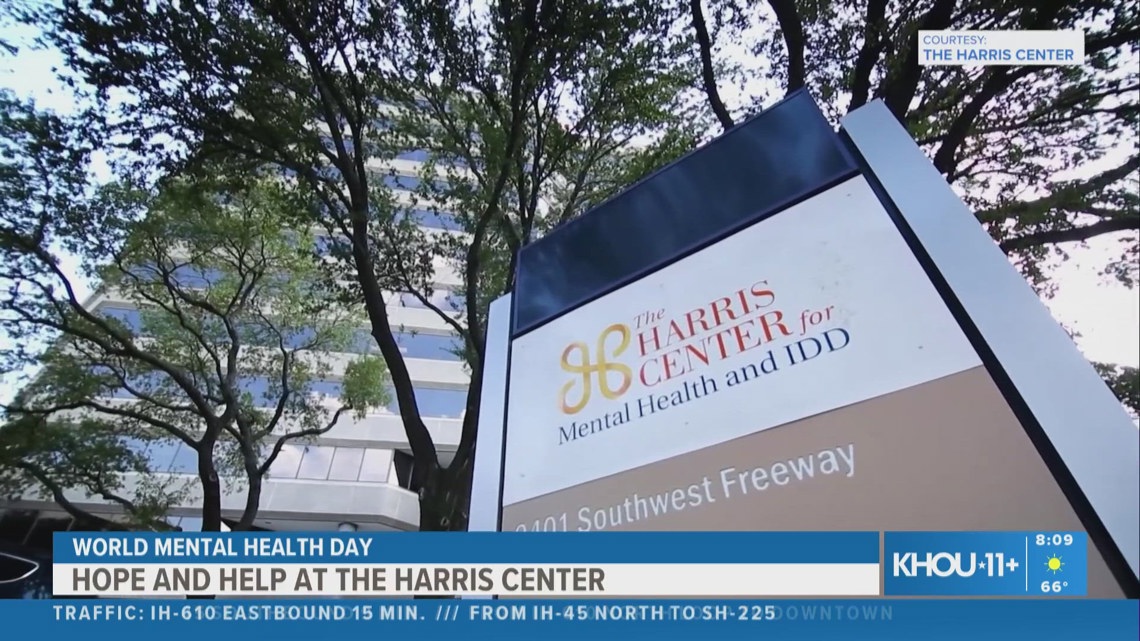The Harris Center crisis specialists are the ones taking calls made to 713-970- 7000, a line that’s available 24/7.
HARRIS COUNTY, Texas — October 10th is World Mental Health Day. The Harris Center for Mental Health has over 80 locations in Harris County that provide free mental health services, including its inpatient and outpatient care.
“We are fielding almost 300,000 calls a year on crisis lines. So, people are using them,” said Tiffany Bittner, the director of suicide care initiatives and director of clinical transformation and innovation at the Harris Center for Mental Health. “A lot of our calls really come from a place of someone kind of hitting that, that rock bottom and just reaching out to where they’ve heard that, hey, I can call this line.”
Her crisis specialists are the ones taking calls made to 713-970- 7000, a line that’s available 24/7. They also answer when people dial 988.
“Just statistically, you know, your minorities, that that group is kind of rising on that rate,” said Bittner.
Once someone calls the line, Bittner says they are routed to the right person to designate the next step to take to get the mental health care they need.
“I’ve dealt with my own mental health struggles,” Bittner said. “I have them in my family. I currently am dealing with them with my nephew. And so, for me, mental health is a huge thing.”
People in need can walk into the center and have immediate access to specific items they may need.
“A lot of people like to journal and write, and we encourage that,” Brittner said. “Safety plans, that is a key, evidence-based intervention for suicide care. One of the things that I think is interesting, when you look at rates of suicide over the last couple of years, is that our older population actually has a statistically high rate of suicide. You think about loneliness.”
The Harris Center answers up to 6,000 calls every month and nearly 40% of all 988 calls in Texas.
Lesley Hooper made one of those calls after she tried to take her own life.
“So, on my last attempt, actually, I was in the darkest of dark. I felt like dirt was more important than me,” Hooper said. “I just wanted to end everything and I overdosed. So, I was in the hospital for three weeks after that, in a coma for three days. And when I came out of that, I just thought, ‘What am I going to do?'”
She said when she woke up, something switched.
“I didn’t want to live still, but luckily, I had the thought go through my head; ‘Normal people do not want to die,'” she said. “That though, I think, saved me, because I got help through the Harris Center. I became a client. I worked with a psychiatrist and a therapist and a peer specialist. And through that help, I was able to find love for myself again and I find hope.”
Hooper said she wanted to pay it forward for the help the Harris Center gave her.
“I fell in love with the idea that I wanted people to come here and receive the help that I got and not feel alone because they’re suicidal,” Hooper said.
Now, Hooper is a program assistant for the Zero Suicide initiative at the Harris Center.
“I get to see clinicians look at people differently and say, ‘Oh, this assessment is actually going to help somebody because they see the difference,'” she said. “When I first got into this position, I went through that darkness again and i reached out for help. My boss was very understanding. I went and did what they call intensive outpatient and just got back on the journey of recovery.”
That one free call connected Hooper to the Harris Center, and she said that changed her life for the better.
“World Mental Health Day and on every day, we want to encourage people to, you know, have the strength to reach out. Be brave, speak up. You’re not along. There are so many people that struggle,” Bittner said.
“My biggest message to those who are struggling with mental health is to reach out. Silence is a killer. And when you think nobody’s listening, there’s always going to be somebody that wants to listen,” Hooper said.
They’re creating a ripple effect for others struggling with mental health to get a second chance.
Bittner and Hooper said the Harris Center’s health services are free for anyone to take advantage of. You can find more information about the Harris Center and how to access their help by clicking here.
Got a news tip or story idea? Email us at newstips@khou.com or call 713-521-4310 and include your name and the best way to reach you.

